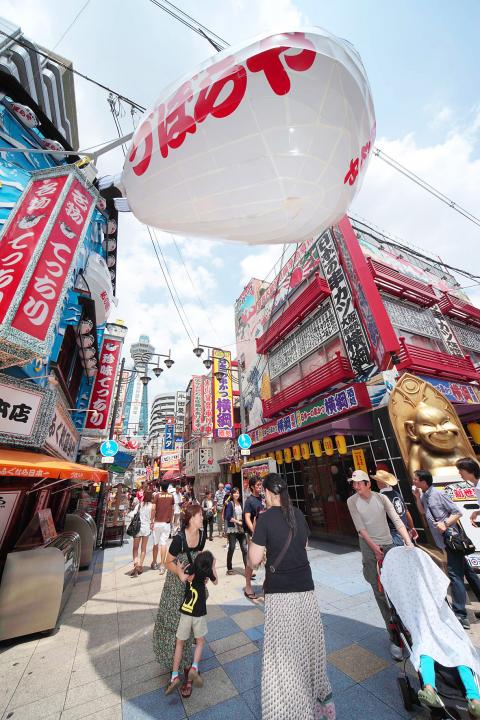Japan yesterday stepped up its warnings over recent steep rises in the yen, with the government pressing the Bank of Japan to help support the economy ahead of its two-day monetary policy meeting.
Japanese Prime Minister Naoto Kan called on the Bank of Japan (BOJ) to support the country’s economy as the stronger yen is a “source of concern” for the government.
The administration “wants the BOJ to underpin the economy with its monetary policy,” Kan said.

Photo: Bloomberg
The request came before the Bank of Japan holds a two-day policy meeting starting today amid expectations that it may decide further easing measures to boost the economy.
Bank of Japan Governor Masaaki Shirakawa said the yen’s strength threatened the profits of Japan’s biggest exporters and could inflict harm on the world’s third-biggest economy.
“We are paying particular attention to the negative impact of the yen’s appreciation on the economy, such as a decline in exports and corporate profits, as well as a deterioration in business sentiment under the current conditions, where uncertainty is high on the outlook for overseas economies,” he said.
The Ministry of Finance has aimed to engage in discussions on foreign exchange intervention with its counterparts in the US and Europe, Dow Jones Newswires reported. Japanese Finance Minister Yoshihiko Noda has said the yen is “overvalued” and its recent rise did not reflect economic fundamentals, with the unit’s strength driven by the weakness of other major currencies.
The US dollar has tumbled in recent weeks against the yen, approaching its post-war low of 76.25 struck in March because of risks associated with US debt and recent data pointing to renewed weakness in the world’s biggest economy.
Japan intervened unilaterally in September to weaken the yen with little success, and was joined by its G7 counterparts to do so again on March 18 after the yen struck a post-war high in the wake of the

SEMICONDUCTORS: The German laser and plasma generator company will expand its local services as its specialized offerings support Taiwan’s semiconductor industries Trumpf SE + Co KG, a global leader in supplying laser technology and plasma generators used in chip production, is expanding its investments in Taiwan in an effort to deeply integrate into the global semiconductor supply chain in the pursuit of growth. The company, headquartered in Ditzingen, Germany, has invested significantly in a newly inaugurated regional technical center for plasma generators in Taoyuan, its latest expansion in Taiwan after being engaged in various industries for more than 25 years. The center, the first of its kind Trumpf built outside Germany, aims to serve customers from Taiwan, Japan, Southeast Asia and South Korea,

Nvidia Corp chief executive officer Jensen Huang (黃仁勳) on Monday introduced the company’s latest supercomputer platform, featuring six new chips made by Taiwan Semiconductor Manufacturing Co (TSMC, 台積電), saying that it is now “in full production.” “If Vera Rubin is going to be in time for this year, it must be in production by now, and so, today I can tell you that Vera Rubin is in full production,” Huang said during his keynote speech at CES in Las Vegas. The rollout of six concurrent chips for Vera Rubin — the company’s next-generation artificial intelligence (AI) computing platform — marks a strategic

Gasoline and diesel prices at domestic fuel stations are to fall NT$0.2 per liter this week, down for a second consecutive week, CPC Corp, Taiwan (台灣中油) and Formosa Petrochemical Corp (台塑石化) announced yesterday. Effective today, gasoline prices at CPC and Formosa stations are to drop to NT$26.4, NT$27.9 and NT$29.9 per liter for 92, 95 and 98-octane unleaded gasoline respectively, the companies said in separate statements. The price of premium diesel is to fall to NT$24.8 per liter at CPC stations and NT$24.6 at Formosa pumps, they said. The price adjustments came even as international crude oil prices rose last week, as traders

Taiwan Semiconductor Manufacturing Co (TSMC, 台積電), which supplies advanced chips to Nvidia Corp and Apple Inc, yesterday reported NT$1.046 trillion (US$33.1 billion) in revenue for last quarter, driven by constantly strong demand for artificial intelligence (AI) chips, falling in the upper end of its forecast. Based on TSMC’s financial guidance, revenue would expand about 22 percent sequentially to the range from US$32.2 billion to US$33.4 billion during the final quarter of 2024, it told investors in October last year. Last year in total, revenue jumped 31.61 percent to NT$3.81 trillion, compared with NT$2.89 trillion generated in the year before, according to